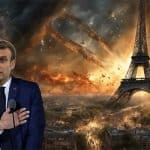Summary of this one hundred and eighty-second bulletin:
03:32 – Economy:
• IMF Stratolization
• Restoration of Russian refineries
• US sanctions vs Russian tankers
• US sanctions vs Russian LNG
• US sanctions against Japan
• US sanctions vs Russian metals
• US sanctions vs French nuclear
• Polish looting
12:30 – Politico-diplomatic:
• Scholz in Beijing
• Unconditional surrender
13:33 – Empire of lies:
• Foreign Policy wants to negotiate
15:43 – Terrorism:
• Maidan in Tbilisi
18:19 – Arming:
• Stoltenberg empties stocks
• Czech shells?
• Used F-35 in Switzerland
• No Greek F-16s for kyiv
20:30 – General military considerations
• Richoux: Gamelin humiliated
• Donbass-Donetsk Canal
• Pravy Sektor on the run
• Mass desertions?
• Foreign Legion in Slaviansk
27:15 – Map of military operations
Let's summarize: the French debt today is 3200 billion euros, or $3425 billion.
Some sources even speak of $3690 billion
The Russian debt was only $358 billion on April 1, 2023. One year of war later, on April 1, 2024, this Russian debt was reduced to $304 billion.2
Russia therefore still has a debt capacity that our country no longer has, on the verge of collapse and bankruptcy.
For the French Mozarts of politics and finance who claimed to collapse the Russian economy (Lemaire) or put it in a state of insolvency (Macron), the slap in the face is gigantic and we impatiently await the verdict of the IMF and that of the rating agencies which should fall in a few days. But don't panic, the mainstream media are there to hide the problem and calm our pain with anesthesia before the European elections, in order to limit electoral damage. They will talk to us about the Paris 2024 Olympics, floods, climate change and as little economy as possible...
Then the Wicked Witch of kyiv, Vic(Toria) “Cookies” Nuland, was ousted from the State Department after torturing the world for decades with her psychopathy.
Then Donald Trump practically sent Nikki Haley back to his Waffle House near Greenville.
Finally, French President Emmanuel Macron tried to convince the whole world that NATO was ready to send troops to Ukraine. Which ones? Clearly not French troops, who are only good at this point for “going on safari in North Africa,” according to Colonel Doug MacGregor.
And not the British ships either, which don't seem to be able to leave port. I think there is a sort of competition between the failures of the Boeing airlines and the failures of the British ships… but I can also be a conspiracy theorist.
*bong*
No, the answer has always been that it would be American troops in Europe fighting Europe's war that everyone – the UK, Davos and its EU apparatchiks, and US neoconservatives – thought it would be a resounding success in bleeding Russia.
And I'm sure that's exactly how they planned it in their Microsoft Project file at Globalist Central.
This clearly did not happen and it is Ukraine which is in great difficulty today. The truth, which has become rare since the start of the war two years ago, is that Ukraine has always been in great difficulty.
And this led, predictably, to the situation we have today. U.S. support for the Ukraine project is coming to an end, if it hasn't already. And the panic in Europe is palpable.
All this was very predictable if we accepted the framework of a split at the top of the American hierarchy. One faction committed to the Davos vision of the future, which involved a docile, even defeated, United States, and another faction that looked up from their screens and said, “Uh…no.”
It was all obvious about eight months ago, when the big NATO summit in Vilnius ended with groans from then-British Defense Minister Ben Wallace. Wallace was supposed to replace Jens Stoltenberg as NATO Secretary General, but was pushed aside by Joe Biden (JOAH Bii-Den!).
After that, there was no further talk of Ukraine joining NATO. Zelensky returned to kyiv with tears in his eyes after Biden gave him nothing either. Then, in October, House Speaker Kevin McCarthy was ousted in a coup by Matt Gaetz and a handful of GOP tax hardliners.
They immediately got new House Speaker Mike Johnson (R-Louisiana) to tie any new foreign aid funding to spending cuts and earmarking funds for border security, in as much as the slim majority in Congress would allow.
Since then, Joe Biden has been forced to look under the Pentagon sofas for a few million dollars to send to Ukraine. He found 300 the other day. As bad as the situation is, the fact that it's millions rather than billions should be considered a victory.
The Senate tried to blackmail Johnson with its ridiculous $95 billion aid bill and Johnson simply pressured boss Chuck Schumer by requesting a two-week recess. Today, the best they can hope for is a more modest bill, with a loan/rental clause, without the money being earmarked for “humanitarian aid” – a euphemism for fill the pockets.
And despite his rapprochement with Senate hawks, Johnson continues to use aid to Ukraine as a way to put domestic financing reforms first. Every day of haggling over these issues is another day that spells the end of Project Ukraine, as Russian forces take towns and villages in Western Donbas every day.
Again, this is not an ideal solution, far from it, but it is a Pyrrhic victory.
But this is the situation after last week and it is much better than at the beginning of the year, since this money was already expected six months ago.
Europe is now able to completely remove the mask. Indeed, as the United States slowly withdraws from Ukraine, the EU's calls for America to stay the course are growing louder and more strident.
Remember that in 2022-23, when it looked like the United States was determined to move forward in Ukraine, European leaders like Macron and others were more circumspect. They wanted to give a warning about the dangers of escalation in Ukraine. They were able to appear as moderates in the situation room, while continuing to send billions of euros in aid and weapons, forcing everyone to comply with their demands.
The real event revealing Europe's real position on this war was Hungary's threat to Viktor Orban of complete economic devastation if he did not allow their aid program to continue. 50 billion dollars to pass to the European Council.
Now that all of Nuland's military plans have failed, the Ukrainian army has been destroyed for the third time, and all their attempts to undermine the United States legally and economically (Powell must Pivot!) have failed, Europe is found in blind panic.
“The US Democratic government and EU leaders, as well as the leaders of the largest EU member states, are pro-war governments. Donald Trump is for peace, Hungary is for peace. This difference is the basis of everything”
We are with "The Voice Kids Russia", Edith Piaf - 'The Hymn to Love' and France recently announced that singer Aya Nakamura would be approached to perform Edith Piaf's Hymn to Love during the opening ceremony of the Paris Olympic Games in 2024. However, a young Russian had given France a real singing lesson with her own interpretation of this iconic song.
In a video that has gone viral on social networks, the young girl sings the Hymn to Love by Edith Piaf with a powerful and moving voice. Her performance is all the more impressive as she speaks French perfectly, which adds an extra dimension to her performance.
In comparison, Aya Nakamura's performance, which was criticized for its lack of emotion and poor pronunciation, seems pale. The young Russian, for her part, was able to convey all the emotion and passion of the song, leaving the spectators speechless and some in tears.
This video also raises questions about France's choice to select Aya Nakamura to perform this iconic song. Although the singer is popular with young people, her performance does not seem up to the occasion. The young Russian, for her part, shows that talent and passion can come from anywhere in the world.
In a previous article entitled “What are Macron's warlike gesticulations and warlike rantings for?”, after emphasizing that the French army did not have the human and military resources to carry out a high-intensity military offensive against Russia, let alone of international legal legitimacy, I concluded my analysis with these words: “In reality, Putin has become Macron’s best ally. It serves as a bulwark to wage its class war against the French proletariat, as a scarecrow to justify and legitimize the authoritarian hardening of governance. To ensure France’s militarist and fascist transition.”
While Macron blusters by threatening to send troops to Ukraine to fight big Russian capital, France continues to widely open French borders to Russian companies and to do business with Russia. We remember that the Minister of the Economy, Bruno Le Maire, declared: “We are going to cause the collapse of the Russian economy” through Western economic sanctions. If there has been an economic collapse, it is that of the French economy.
For a minister determined to torpedo Russia's economy, it is surprising to learn from reliable sources that he is authorizing several companies to continue their trade with Russian companies. The French bourgeoisie is not near hypocrisy. It's not an imposture.
This is the case with the agrochemical factories of the Boréalis group, which has production sites in Austria and Germany, but above all three factories in France: near Rouen, near Melun and in Alsace. Thousands of tonnes of Russian ammonia continue to arrive at Boréalis' French factories, notably that of Rouen. As a reminder, Russia is the world's leading exporter of ammonia, which, curiously, does not seem to be subject to European sanctions packages. Because, according to specialists, this raw material constitutes an important issue for Europe, and therefore for France.
In a recent report, Greenpeace revealed how the French company Framatome, a subsidiary of EDF, and the German company Siemens Energy continue their business with the Russian state nuclear company Rosatom. “France is lobbying fiercely at the European level in order to protect the interests of the nuclear industry and continue its nuclear trade with Rosatom,” underlines Greenpeace.
While, on the diplomatic front, Macron theatrically raises the threat of war against Russia, on the economic front, the real sinews of war, that is to say the valorization of capital, the French company Framatome , peacefully signs a joint venture with the Russian giant Rosatom to manufacture nuclear fuel in Germany. This cooperation between the two giants arouses indignation and protest in Germany. Indeed, the agreement concluded between the French Framatome and the Russian Rosatom fuels controversy in Germany, where the factory is located in which Framatome will assemble, under Russian license, the fuel intended to power nuclear reactors. Thousands of German opponents expressed their anger against this Franco-Russian cooperation, experienced as a betrayal, even a dagger planted in Germany's back by France.
In addition to the agrochemical and nuclear sectors, France and Russia are continuing their economic idyll in the field of wine, particularly that of fine wines. According to exclusive customs documents published by the economic site Challenges, on March 16, 2024, great Burgundy wines were delivered during the years 2022 and 2023 to Moscow, bypassing the European embargo. In economic matters, the credo of the Macron regime is: what matters is the bottle (the State, pseudo-democratic or dictatorial), as long as we have the intoxication (of money)!
“I am not going to delve into the bloody history of NATO, but you need to know it to understand that the Alliance has been a constant source of dangers, crises and conflicts for many years,” Nikolai Patrushev said in an interview. in the newspaper Argoumenty i Fakty published on April 2. He was speaking ahead of April 4, the date marking 75 years since the creation of the North Atlantic Treaty Organization.
The Secretary of the Russian Security Council highlighted NATO's role in compelling its members to "obediently comply with the implementation of economic sanctions, the 'freezing' of financial assets, the practice of espionage, psychological operations, cyberattacks and to join in actions that compromise the systems of government of states in disagreement with the policies of the Anglo-Saxons.
“All NATO policies are based on instructions from Washington,” he continued. Before adding: “[Washington] uses the Alliance to maintain its armed presence in Europe and demonstrate to its satellites its indispensable nature, to ensure the security of this continent.”
The Alliance “is a de facto party to the Ukrainian conflict and actively participates in the organization of neo-Nazi bombings on Russian territories,” Nikolai Patrushev further denounced. Ukraine indeed attempted several incursions into the Russian regions of Kursk and Belgorod in April. These regions are also bombarded almost daily by Ukrainian forces.
The Russian leader added that the Alliance does not “disdain using terrorist organizations for its own benefit.” These words are full of meaning as Moscow suffered a terrorist attack which left 144 dead on March 22.
Nikolai Patrushev, during the same interview, estimated that the fall of the Soviet Union had been for Westerners only a “step” on the path to the “political and economic weakening of Russia”. A weakening explicitly declared by NATO leaders.
The weakening of Russia as a goal of the Alliance
“NATO is systematically strengthening its military potential on our borders,” noted Nikolai Patrushev. According to the Secretary of the Security Council, the ultimate goal of the Alliance would be to “remove Russia from the political map of the world by dismembering it”. He noted that military spending by NATO members reached 50% of global spending in this area, increasing for the ninth consecutive year and exceeding $2023 trillion in 1.
He also claimed that the technique of encouraging Russophobia and scaring European citizens "with a false 'Russian threat'" was an attempt by their leaders to make them forget the growing internal and economic problems they were facing.
Vladimir Putin, aware of external forces seeking to divide the country, including some Western actors and Israel who seek to blame Muslims, expresses his determination to maintain the unity and cohesion of Russian society. He asserts that no one will be able to sow the seeds of discord, panic and division among the Russian population, which is made up of different ethnicities and cultures. He thus wishes to reassure Russian citizens and encourage them to remain united in the face of adversity.
“Dear Russian citizens!
I am writing to you about a bloody and barbaric terrorist act, the victims of which were dozens of peaceful and innocent people – our compatriots, including children, adolescents and women. Doctors are now fighting for the lives of the victims, those who are in serious condition. I am sure that they will do everything possible, if not impossible, to preserve the life and health of all those injured. Special words of gratitude to paramedics, special forces soldiers, firefighters, rescuers who did everything to save people's lives, remove them from the fire, from the epicenter of fire and smoke and avoid further losses more important.
I cannot ignore the help of ordinary citizens who, in the first minutes after the tragedy, did not remain indifferent and, together with doctors and security officers, provided first aid and transported the victims to hospitals .
We will provide the necessary assistance to all the families whose lives have been affected by a terrible misfortune, to the injured. I express my deep and sincere condolences to all those who have lost a loved one. The entire country, all our people, mourn with you. I declare March 24 a day of national mourning.
In Moscow and its region, as well as in all regions of the country, additional anti-terrorism and anti-sabotage measures have been introduced. The main thing now is to prevent those who are behind this bloodbath from committing a new crime.
As for the investigation into this crime and the results of operational investigative actions, the following can currently be said. The four direct perpetrators of the terrorist attack, all those who shot and killed people, were found and detained. They tried to hide and headed to Ukraine, where, according to preliminary data, a window was open for them from the Ukrainian side to cross the state border. A total of 11 people were arrested. The Federal Security Service of Russia and other law enforcement agencies are working to identify and uncover the entire complicit base of terrorists: those who provided them with transportation, laid out routes of evacuation of the crime scene, prepared caches, caches of weapons and ammunition.
I repeat: investigative and law enforcement agencies will do everything to establish all the details of the crime. But it is already clear that we are facing not just a carefully and cynically planned terrorist attack, but a prepared and organized massacre of peaceful and defenseless people. The criminals decided calmly and deliberately to kill, to shoot at point blank range at our citizens, our children. Just as the Nazis once committed massacres in the occupied territories, they decided to stage a spectacular execution, a bloody act of intimidation.
All perpetrators, organizers and clients of this crime will suffer fair and inevitable punishment. Whoever they are, whoever guides them. I repeat: we will identify and punish all those who are behind the terrorists, who prepared this atrocity, this attack against Russia, against our people.
We know the threat of terrorism. Here we count on interaction with all states that sincerely share our pain and are ready to truly join forces in the fight against the common enemy, international terrorism, in all its manifestations.
Terrorists, murderers and non-humans who do not and cannot have nationality face an unenviable fate: punishment and oblivion. They have no future. Our common duty from now on, to our comrades on the front, to all the citizens of the country, is to be together in a single formation. I believe that it will be so, because no one and nothing will be able to shake our unity and our will, our determination and our courage, the strength of the united Russian people. No one will be able to sow poisonous seeds of discord, panic and discord in our multi-ethnic society.
Russia has repeatedly gone through difficult, sometimes unbearable trials, but has become even stronger. It will be like this from now on. »
Vladimir Putin answers questions from Dmitry Kiselyov
D. Kiselyov: Vladimir Vladimirovich, in stating your Message [to the Federal Assembly], you have, figuratively speaking, pulled out of your sleeve [Like a magician — Editor's note] trillions [Billion: thousand billion, called "trillion" in Russian — Ed.] and trillions. You have thus proposed an absolutely astonishing development plan for the country — absolutely astonishing. This is a different Russia, with a different infrastructure, a different social system — simply a dreamland.
This makes me want to ask you your favorite Vysotsky question: “Where to get the money, Zine?” Did we really earn this money?
V. Putin: Yes, of course.
More than that: first of all, all this was planned during the careful work of the community of experts, specialists of the Government and the Administration [of the President]. Everything is perfectly within budget rules and, in fact, quite conservative, as some experts believe there should be and will be more revenue. This means that we should have planned more spending, as this should have a direct impact on economic development prospects.
In general, this is correct, but in 2018 we also planned to allocate another 8 trillion for the development of the economy and the social sphere, and then we increased this spending. I think it's quite likely that, if things play out as the optimists on the panel I mentioned say, we can—we must and we will be able to—increase this spending in different areas.
D. Kiselyov: So we are talking about a period of six years?
V. Putin: Exactly. We're talking about a six-year period. We are in the process of developing a budget for a three-year period—a three-year planning period, as they say. But, of course, when we were preparing the speech — I say “we were preparing the speech” because there is a whole team working on this subject — we assumed that we would calculate our revenues and our expenses in the areas that we considered as key, priority, for six years.
D. Kiseliov: The fact remains that there are literally astonishing projects. For example, the Sochi-Jubga highway: 130 kilometers, of which 90 kilometers are tunnels, the rest are probably bridges, judging by the landscape. A billion and a half just for the first three years, and the highway should ideally be ready by 2030. How much is needed and will it be enough to win?
V. Putin: People need this highway. Families with children cannot get to Sochi by car. Everyone stops somewhere near Gelendzhik or Novorossiysk, because the highway is very difficult — a serpentine road.
There are several construction options. We will literally discuss it in the coming days: either build it to Jubga, or build it first from Jubga to Sochi. Some members of the Government suggest proceeding in stages. Others think that everything must be done at the same time, otherwise there will be a narrow corridor from Jubga to Sochi.
The first part, if you watch from Novorossiysk, is more or less decent, and the coverage is not bad, but it is very narrow. If we arrive in Sochi like the first part, traffic jams may occur in this small space, and there are enough of them today.
In general, we will determine this with specialists — how, by what steps, but it must be done. Of course, we need to determine the final cost of the project and ensure everyone stays within financial plans.
The interest of the people first, but also of the economy. The development of the territories in the south of the country is very important.
D. Kiselyov: If we can afford such large-scale investments, it means that the country is rapidly getting rich, especially in the conditions of the Special Military Operation, in the conditions of almost 15 sanctions, which are absolutely wild. In addition, we have made it our mission to reduce poverty, including among large families. Isn't it too bold?
V. Putin: No. Look, if we get back to this highway. When I discussed it with members of the Government — as you know, the Ministry of Finance is always miserly in the good sense of the word, always very conservative in terms of spending — the Minister of Finance [Antone Silouanov] told me said, almost word for word: “Only those who have never used this road are opposed to its construction today.”
D. Kiseliov: That is to say, we would have to take the entire Government there.
V. Putin: And he is right, because it is particularly [important] for families with children.
As for whether we are getting rich or not. The economy is growing — that is a fact, and a fact that has been recorded not by us, but by international economic and financial organizations. We have indeed overtaken the Federal Republic of Germany in terms of purchasing power parity, taking its place — fifth — among the world's largest economies.
The German economy contracted, I believe, by 0,3% last year, while we grew by 3,6%. Japan advanced by a small percentage point. But if things continue to evolve at the same pace as today, we have every chance of taking Japan's place and becoming the fourth largest economy in the world in the not too distant future.
However, we must be honest and objective: there is a difference between the quality of our economies. In terms of purchasing power parity, that is to say in terms of volume, we are really fifth and we have every chance of taking Japan's place. But the structure of their economies, of course, differs favorably from ours.
We still have a lot to do so that, not only in terms of purchasing power parity, but also [in terms of GDP] per capita, we are in a decent position — that's number one. Second, the structure itself must change to become much more efficient, more modern and more innovative. This is what we are going to work on.
When it comes to income, purchasing power parity is a very important indicator. It's the volume, the size of the economy. This means that the state receives funds to solve strategic tasks through the tax system at all levels. This gives us the opportunity to develop as we believe is necessary for our country.
D. Kiselyov: By the way, you are talking about the structure, the need for structural changes in our economy. After all, this is exactly what was stated in your speech, and this is how the task is set: for innovative industries to develop faster than the economy on average.
V. Putin: Yes, of course.
I have already said it: it is the structure that we must work on. The future of our economy, the future of labor resources, labor efficiency and productivity depend on it.
One of the main tasks today is to increase labor productivity. Indeed, in a context of shortage of workers, labor resources, we have only one way to develop effectively, namely to increase labor productivity. This means that we must increase the innovation potential of the economy, for example by increasing the density of robotization. Today we have ten robots, I think, for 10 workers, and we need at least a thousand robots for 000 workers. I think this is the case in Japan.
And for people to be able to work with this new equipment — not only to use robotics, but also other modern means of production — we need to train them. Another problem arises, that of staff training.
We have entire areas set aside for this purpose, including engineering training. I am sure you have noticed that we have already launched 30 modern engineering colleges across the country. This year we are launching 20 more, making 50 in total. And we plan to launch 50 more in the coming years.
These directions are therefore the future of our country. We will move forward and develop in this direction.
D. Kiselyov: To finish the question of sanctions: several expressed the idea of creating a special body which would deal with sanctions, their reflection and, in general, defense against sanctions. Is this idea being considered or does it not make sense?
V. Putin: It is simply not necessary. We analyze — the Government, the Central Bank, the Security Council — everything our enemies do. Many things are done not for political or military reasons, although they are defended that way, but simply for competitive reasons...
D. Kiseliov: Unfair and unscrupulous competition.
V. Putin: Unfair competition — which is hidden behind political or military considerations. This was the case in the aviation industry, and it is the case in many other industries.
We live in the world as it is and we have adapted to it. We understand who we are dealing with. And so far, as you can see from the results of our work, we have been quite effective.
D. Kiselyov: But the perfidy of the West is not limited to sanctions. Here is an excerpt from your Message [to the Federal Assembly]: “the West is trying to drag us into an arms race, thus exhausting us and repeating the trick it pulled off in the 1980s with the Soviet Union” . What is our margin of safety in the event of an arms race?
V. Putin: We must ensure that every ruble invested in defense brings us the maximum return. Indeed, in Soviet times, no one counted these expenses, no one, unfortunately, sought efficiency. Defense spending accounted for about 13% of the Soviet Union's country's GDP.
I will not refer to our statistics, but to those of the Stockholm Institute: last year our defense spending amounted to 4%, and this year to 6,8%, which means that we have grew by 2,8%. In principle, this is a noticeable increase, but it is absolutely not critical. In the Soviet Union we spent 2,8%, while today we spend 13%.
I must say that defense spending speeds up the economy, makes it more energetic. But of course there are limits, we understand that. The eternal question is which is more profitable, cannons or butter? We have it in sight.
However, I repeat, the good thing about our modern defense industry is that it not only indirectly influences civilian industries, but also uses innovations necessary for defense to produce civilian products. This is an extremely important aspect.
Our expenses are obviously not comparable. How many are already in the United States? Eight hundred…
D. Kiselyov: Almost nine hundred already.
V. Putin: Almost 900 — 860 or 870 billion [dollars]. This is absolutely incomparable to our expenses.
D. Kiseliov: I have the impression that they are stealing there, because they don't have hypersonics or anything [like that]... What is it? ?
V. Putin: Let me explain to you what it is. The fact is that they spend a huge amount of money on maintenance — and not just on salaries, but also on maintaining bases around the world. And there, like in a black hole, everything goes there — you can't count it. This is where most of the money is pilfered. Although in the production of means of destruction and weapons in general their expenses are also difficult to estimate.
If you calculate what it cost them, for example, the famous anti-missile defense system and one of the main elements of overcoming this system on our side — Avangard, an intercontinental missile, a gliding unit with intercontinental range — this are simply incomparable values. And we actually reset everything that they did, everything that they invested in this missile defense system. This is how it should be done.
And of course, without a doubt, the very economy of our armed forces must meet today's demands.
D. Kiselyov: The word “fairness” is a magic word for the Russian language. You use it very carefully, but once you said it in your speech, it came like a bolt from the blue. You said that the distribution of the tax burden should become more equitable in Russia, and you suggested that the Government think about it. In what direction should we think?
V. Putin: You know, the distribution of the tax burden should be fair in the sense that companies, legal entities and individuals who earn more, in simple terms, should allocate more to the State Treasury for solving national problems, firstly for solving problems linked to poverty reduction.
D. Kiseliov: A progressive tax?
V. Putin: Yes, in fact, a progressive tax.
I don't want to go into details now, we have to work on it. And we need to build this system in such a way that it really has a big impact on solving, first of all, social issues and the tasks facing the state in this area.
For example, we plan to reduce the tax burden on large families and take a number of other measures in this direction. It seems to me that society will accept this quite normally. First of all.
Secondly. What are the companies themselves asking of us? They ask that we decide on the tax system, but that we do not touch it again, that it be stable. This is the most important demand and requirement of businesses.
The Government is expected to consider this issue in the very near future and submit proposals together with State Duma deputies.
D. Kiselyov: Progressive tax — we won't scare anyone away? In the past we were always afraid of scaring away entrepreneurs with this progressive tax.
V. Putin: No, I don’t think so. In principle, we have this system in place. Even those who were strong advocates of the uniform scale, the authors of the uniform scale, now believe that, overall, we are ripe for a much more selective approach.
D. Kiselyov: During your Message you thanked the “colleagues of the Government” – that is how you phrased it. Does this mean that Mishustin's Government — if you win — will remain in place?
V. Putin: To tell the truth, we should talk about it after the election, after the vote count. It seems to me that this is simply incorrect today. But overall, the Government is working — as we can see, the results are obvious, these are objective data — it is working in a completely satisfactory manner.
D. Kiseliov: You mentioned reducing the tax burden on large families. Children and demographics — these topics figured prominently in your Message. Indeed, the question is very painful, because Russia is demographically shrinking. Last year, the birth rate broke all records.
V. Putin: I believe the birth rate was 1,31 or 1,39….
D. Kiseliov: 1,39 children per woman capable of giving birth.
V. Putin: Of childbearing age.
D. Kiseliov: The ideal would perhaps be to double it, that is to say to increase it to three. Because it is literally a disaster for society.
You proposed a large-scale maternity support and demographic stimulation program. Can we believe that these measures will make it possible to reverse the downward trajectory towards an upward trajectory?
V. Putin: In general, if we take all measures aimed at supporting families with children, we plan to spend up to 14 trillion rubles over the next six years, through different channels. It's a huge amount.
There are many areas of assistance to families with children: from general social assistance — construction or renovation of kindergartens, construction of new schools, repair of old schools, upgrading — to assistance for women , from pregnancy to her child's age of 18. In fact, nearly 400 women currently benefit from benefits. Almost one in three women are expecting a child. And more than ten million children receive benefits. This is a serious thing.
We have maintained the maternity capital system. We have maintained payments — these decisions are being made — of 450 rubles per family, if a third child appears, for repayment of a mortgage loan. We have maintained the advantages linked to mortgage loans for families with children. Generally speaking, there are a range of very different areas to support families.
Of course — you have already said it — it is also the fight against poverty, because, of course, it is much more difficult for families with children than for families without children. It's understandable, the expenses are greater. Nevertheless, we have managed to achieve a lot in this area.
20 years ago, 29% of the population lived below the poverty line, or 42 million people. Today, this percentage is 9,3%, according to the latest data, but that still represents 13,5 million people. Of course, that's a lot. Of course, we must do everything to reduce it to 7% at most. And for large families, the figure is more modest, but it also needs to be improved.
Where to start when we talk about birth rate problems? I've said it many times before, and the experts have talked about it, these are objective things, namely: we have experienced two very sharp declines in the birth rate. During the Great Patriotic War, in 1943-1944. There was also a comparable decline immediately after the collapse of the Soviet Union. Ditto, the same drop in the birth rate.
The reason is clear: the social support system has collapsed. As low as it was in the USSR, if we can talk about it, it still existed, but after the collapse of the Soviet Union it almost completely disappeared and poverty began to be total. No need to talk about it today. Regardless, the family planning horizon receded during these years, and the birth rate fell until the war years. Then there was a recovery. Today we have a large number of children, young people who in a few years will enter adulthood and childbearing age, and we assume that our rates will also increase.
What you said is a global trend. Only a few countries with developed economies display positive demographic dynamics, while in all other countries everything becomes negative. This is a complex issue related to economics and women's priorities in life. It's better not to dwell on it now, let's let the demographers talk to us about it and offer us the solution.
But you know what gives us optimism? The state of mind of society. 70% of men and 72% of women want to have two or more children, and the state must support them. It's a whole set of support measures that we're planning — they need to be implemented, and we will.
D. Kiseliov: But it is still not certain that these measures will make it possible to reverse the situation.
At the end of the 90s – it's a well-known story, you told it yourself – you saved your children from a fire: you entered a burning house, on the first floor. And only then did you remember that there was money elsewhere. The money burned in the fire. This shows your priorities: children first, money second.
It may be the same today on a national scale. Should we give up — not 14 [trillion], but everything, and create such a program to ensure that this situation is reversed?
V. Putin: You know, you have to look at the course of things, as they say. In the early 2000s we took a number of measures in the field of demography, including the introduction of maternity capital and a number of other measures that had an obvious positive result. So we can achieve the goals we need.
D. Kiselyov: So there is such an experience?
V. Putin: We have experience, of course, we have experience. And thanks to this experience and other modern developments, we should expect to achieve the goals we have set for ourselves. And depending on events, we will adjust these measures or add something else to the measures we apply.
For example, we have just declared the Year of the Family. We have a new national project called “Family”. It has elements that we have never used before. For example, 75 billion rubles will be allocated to regions where the birth rate is lower than the national average. These are mainly the central and north-western regions of Russia. 75 billion rubles is decent money. You just have to manage it wisely.
There is also an “elderly care” component. There are other support measures. We must increase the birth rate and life expectancy, in order to stabilize the country's population. This is the most important integral indicator of our success or, perhaps, work that requires additional attention from all administrative levels and authorities.
D. Kiselyov: Yes, but everywhere in the world there is a third tool for solving demographic problems: immigration. What are the numbers we can talk about over this six-year period and what would systemic work be in this area?
V. Putin: If we talk about immigrant workers, we do not have many of them compared to other countries — they represent 3,7% of the total number of workers. But they are concentrated in the regions where economic life is most active, and there they are of course much more numerous. These are the Moscow region, the city of Moscow, the North-West region and some northern regions, where the salary level is decent. But it is undoubtedly an issue that requires special attention from authorities — local, regional and federal.
What did I want to say here? This is a very important thing. After all, when hiring immigrant workers, we always talk about the need to do so due to labor shortages. Our entrepreneurs must understand that the situation in terms of labor availability will not change for the better in the coming years — they will necessarily face a labor shortage.
This means that to solve this problem in a cardinal way — I return to what we have already talked about — we must increase labor productivity and reduce the number of workers in areas where this is possible, obtaining even greater results thanks to the introduction of modern technology. To do this, we need to invest in this area and train staff — we've talked about this before. This is the most important thing we need to think about.
Generally speaking, of course, migration policy is an important tool for the economy. It is not a sin to draw inspiration from the experience of other countries. First of all, of course, we must talk about the repatriation of our compatriots. What is repatriation and what are compatriots — we already have a normative framework that there is no need to repeat here.
We need to talk about welcoming people who may not intend to settle in the Russian Federation, but who, due to their qualifications and talents in various fields, can make a significant contribution to the development of our state, of Russia. We will also be happy to welcome such people.
As for traditional migrant workers, we also need to think about how to prepare them to come to Russia, including with our partners in the countries where they live. This means that they must learn the Russian language, our traditions, our culture, etc. We have to take care of them here, treat them humanely. So that they integrate naturally into our society. All of this should have a corresponding positive effect, I hope.
Yes, and of course everyone must respect our traditions and the laws of the Russian Federation. And of course, compliance with health and other standards is in high demand. The safety of citizens of the Russian Federation must come first.
D. Kiselyov: The Russians are probably the most divided nation in the world. You had an interview with “The Leaders of Russia” and one of your interlocutors said that in the Zaporozhye oblast we discovered that they were as Russian as we are. For them, it was a revelation. In general, it really is like that, and we are developing our new regions, and Odessa is a Russian city. I guess there's a lot of hope in that direction too?
V. Putin: Of course. The population density in these areas has always been quite high and the climate is wonderful.
As for Donbass, it is an industrially developed region, even during the times of the Soviet Union. How much did the Soviet Union invest in this region, in its coal mines, in its metallurgical industry! Yes, of course, investments are needed so that all production is up to date, so that the living and working conditions of the population are built in a completely different way — not as they were a few decades ago .
As for Novorussia, it is a region where developed agriculture is well established. Here we will do everything in our power to support both traditional areas of activity and new areas that organically fit into these regions and people's desire to develop them. And, you know, the people there are very talented.
In addition, as I already mentioned, the taxes collected in these regions are already paid into the federal budget. Yes, at this stage they need to be helped, supported and pulled towards the Russian republican, federal level. They will work, these regions, and very quickly.
D. Kiselyov: Historically, it is obvious that Nazi regimes do not dissolve on their own, but disappear following military defeat. This was the case in Germany, Italy and Japan. It will be the same for the Banderist Nazi regime. We are now moving forward across the entire front line, judging by reports from the Ministry of Defense and our war correspondents.
But have we managed to find a way of fighting that allows us to reduce losses on the offensive compared to the defense? This is not a trivial task for the art of war, but it always slows down the offensive. It's an economy that makes perfect sense for our heroic warriors. But a question arises: how to move forward with a minimum of losses?
V. Putin: The question is understandable and fair. But the answer is also simple: we must increase the means of destruction — the number and power of the means of destruction, increase the effectiveness of the forces and means used. Aviation — both tactical aviation and army aviation, as well as strategic aviation. I am of course talking about the acceptable components for armed conflicts of this type. These are ground means of destruction, including high-precision weapons. These are artillery, armored vehicles. We are developing this technology, without exaggeration, by leaps and bounds.
D. Kiselyov: In this direction?
V. Putin: Yes, that is what is happening. This is the answer to your question: the more power and means of destruction, the fewer victims there are.
D. Kiselyov: But the question remains: what price are we prepared to pay — the word “project” is perhaps not appropriate here — for all this challenge that we have been forced to face during the 'History ?
V. Putin: Look, every human life is priceless, every life. And the loss of a loved one is an immense grief for a family, for any family.
But what is the question? The question is to define the very fact of what we do. What do we do ? Today, during a meeting, as you just noticed, one of the participants in the conversation said: we were surprised to find that there were Russians just like us there. We came to help these people. This, in principle, is the answer to your question.
If we abandon these people today, tomorrow our losses could be multiplied, and our children will not have a future, because we will not feel safe, we will be a third or fourth class country, no one will take us into consideration if we cannot defend ourselves. The consequences could be catastrophic for the Russian state. This is the answer.
D. Kiselyov: The Americans seem to be talking about negotiations, about strategic stability, but at the same time they say that it is necessary to inflict a strategic defeat on Russia. Our position is: “We are open to negotiations, but the time for kind gestures has passed, it is over.” So there will be no negotiations?
V. Putin: We have never refused to negotiate.
D. Kiseliov: But how is this possible without kind gestures, and therefore without compromise? How ?
V. Putin: I will try to explain it. When we negotiated in Turkey, in Istanbul (I have already said this many times, but it must be repeated, I will do it) with the negotiators of the opposing side, we ended up with a thick folio, a document, in fact a treaty, a draft treaty. An extract from this treaty was initialed by the head of the Ukrainian side's negotiating group, Mr. Arakhamiya. He did it, there is his signature (we have it in the Administration). But then, as you know, Mr. Arakhamiya himself said it publicly to the whole world, also in an interview, I think, with journalists, with foreign journalists even: the former British Prime Minister, Mr. Johnson, came and dissuaded them from finally signing and, therefore, executing this agreement. And the topic that you just mentioned was brought up: we must defeat Russia on the battlefield.
Are we ready to negotiate? Yes, we are. But that's it: we are ready to negotiate not on the basis of any "wishes" after the consumption of psychotropic drugs, but on the basis of the realities which have taken such a turn, as they say in these cases, on the ground . This is firstly.
Secondly. We have already been made many promises. They promised not to expand NATO to the East, and we see them on our borders. They promised, without going into history, that the internal conflict in Ukraine would be resolved peacefully, politically. If we remember correctly, three foreign ministers came to kyiv, Poland, Germany and France, and promised that they would be the guarantors of these agreements — and the next day there was a coup State. They promised to respect the Minsk agreements, then publicly announced that they were unlikely to keep these promises, but only got a break from arming the Banderist regime in Ukraine. We have been promised many things, so promises alone are no longer enough.
To negotiate now, just because they are out of ammunition, would be somewhat absurd on our part. Nevertheless, we are ready for a serious conversation and we want to resolve all conflicts, and this one first of all, by peaceful means. But we must clearly and distinctly understand that this is not a pause that the enemy wants to take to rearm, but a serious conversation with guarantees for the security of the Russian Federation.
We know the different options that are being discussed, we know the “carrots” that will be shown to us to convince us that the time has come. We want, I repeat once again, to resolve all disputes and this dispute, this conflict, by peaceful means. We are ready to do it, we want it. But it must be a serious conversation with the security of the opposing side, that is, in this case we are primarily interested in the security of the Russian Federation. It is on this basis that we will proceed.
D. Kiselyov: Vladimir Vladimirovich, it seems to me that we look a little too noble. Will it not happen that we conclude something with them, that they deceive us again and that we console ourselves by telling ourselves that we were honest, but that they deceived us? Is it our destiny, after all, to always be the joke?
Americans minted medals for themselves in the 1990s for winning the Cold War, and all the decades since have been decades of big lies. How can we hope that they will finally conclude an honest treaty with us, which they will respect and which will include guarantees for us? I have no idea how to deal with them? Do you really believe this is possible?
V. Putin: Sorry to say this, but I don't believe anyone.
D. Kiselyov: Oh good.
V. Putin: But we need guarantees. The guarantees must be made explicit, they must be those that suit us and that we can believe in. This is what we are talking about.
It is probably premature to speak publicly about what they might be. But we certainly will not accept empty promises.
D. Kiseliov: I fear that you will be quoted extensively. Do you trust no one at all, or are you referring to Western partners in this case when you say you trust no one?
V. Putin: I prefer to be guided by facts rather than by good wishes and calls to trust everyone. You see, when decisions are made at this level, the degree of responsibility for the consequences of those decisions is very high. This is why we will not do anything that is not in the interest of our country.
D. Kiselyov: Vladimir Vladimirovich, what happened to Macron? Has he lost his mind? He is going to send French troops to fight our army, he looks like a Gallic warrior rooster, and he has scared all the Europeans. How should we respond to this?
V. Putin: The fact is that Western military forces have been present in Ukraine for a long time, even before the coup, and after the coup their numbers increased. Today, they are present directly in the form of advisors, they are present in the form of foreign mercenaries and they suffer losses. But if these are official military contingents of foreign countries, I am sure that this will not change the situation on the battlefield – this is the most important thing, just like the delivery of weapons does not change anything.
Second, it can have serious geopolitical consequences. Because if, for example, Polish troops enter the territory of Ukraine, as seems to be the case, to cover the, say, Ukrainian-Belarusian border or in other places to free Ukrainian military contingents so that they participate in combat operations on the contact line, I think that Polish troops will never leave this territory again. This is my belief. They only dream of regaining these lands, which they consider historically theirs and which were taken from them by the “father of nations” Joseph Stalin and given to Ukraine. They want them back, of course. And if official Polish units enter, they are unlikely to withdraw.
But other countries that lost part of their territory as a result of World War II could follow this example. I think that the geopolitical consequences for Ukraine, even from the point of view of preserving its statehood in its current form, will of course manifest themselves in all their glory.
D. Kiselyov: If we return to Macron, perhaps he decided to take revenge on Russia for the fact that we “stepped on its toes” in Africa, and that we had to “stay there and to fear" ? He probably didn't expect us to be so active there.
V. Putin: Yes, I think there is some resentment, but when we were in direct contact with him, we spoke quite frankly about this topic.
We did not bury ourselves in Africa, we did not oust France from it. The problem is elsewhere. The famous Wagner Group first carried out a number of economic projects in Syria and then traveled to other countries in Africa. The Ministry of Defense provides support, but only because it is a Russian group, nothing more. We didn't oust anyone. Quite simply, the African leaders of certain countries reached an agreement with Russian economic operators, they wanted to work with them, they did not want to work with the French in certain respects. It wasn't even our initiative, but that of our African friends.
There is no reason to blame us in this regard, if an independent state wants to develop relations with its partners in other countries, including Russia, it wants to develop relations with Russia. We did not touch them, the former French colonizers, in these countries. I even say this without irony, because in many countries where France has historically been a metropolis, we don't really want to deal with them. It has nothing to do with us. Maybe it's easier to blame someone than to see your own problems. Perhaps such a sharp and rather emotional reaction on the part of the French president is connected, among other things, with what is happening in some African states.
Although I know other countries in Africa which do not see any problem with the French staying and who say "yes, that suits us, we are ready to work with them", the fact remains that in some countries they do not want to do it. It has nothing to do with us. We are not inciting anyone there, we are not turning anyone against France.
We do not set ourselves such tasks. To be honest, we do not have national tasks there at the Russian state level. We're just friends with them, that's all. They want to develop relationships with us — please, we are going against them. There is no reason to blame us.
D. Kiselyov: But now they say in France that there are no more “red lines” in relation to Russia, that nothing is impossible and that everything is possible. In general, they want to somehow talk to us on a balance of power basis. What you hear from France, the West, Lithuania... In general, it is a dissonant, but hostile chorus.
Perhaps we too should opt for unconventional solutions and, at some point, seek help from the two million-strong North Korean army? For example, in exchange for our “nuclear umbrella” over half of the Korean peninsula? Why not ?
[...]
It's war, Emperor Palpoutine threatens France and thanks to the legislation on requisitions (idiot trap) we can clearly see the slight temptation to seize savings, sorry to drain, as Bruno Le Maire would say, these considerable sums that Europeans have in their bank accounts. These colossal savings that he is eyeing to finance our considerable deficits.
But rest assured, we are in a democracy and in democracy we have the values of the Republic which protect us.
We therefore take your Livret A to finance the war in Ukraine without asking you if this suits your “morality” and your social responsibility.
It’s true what…
Financing Total and the gas stations is bad.
But that Livret A finances the war and the cannon merchants… that’s good!
This will all go wrong, plus it's a very bad idea in terms of risks.
Is there anyone who can warn Bruno? Send him this note, he must not know about it at Bercy!
Come on, let me explain.
We have to finance the war, very good tintin. But if Bruno gives money to the shell factories like what he did to the mask factories during the last war against a vir-Russian, while here it is against the Russians quite simply, the factories made masks then they immediately went bankrupt.
The same thing will happen with the war. War is a thing for stupid idiots. So we produce weapons, we get in the face, then we make peace. Always. When you put your mind to it, you produce a lot. Once we make peace we no longer produce anything or very little. The gun dealers will go bankrupt.
The problem is that the artist from Bercy, Bruno, guarantees the booklet A…. or the booklet hahahahahahahahahahha.
So he's going to finance something that's going to fail in the long term by using money that he has to guarantee while reducing the debt... hahahahahahahahaha.
Haaa, the star of Bercy must tell him everything.
My Bruno, drop booklet A, you have to do the LDG. Yes, the war book. LDG. I removed the second D side for sustainable… on the ecology side, war is average.
So my Bruno, you are launching an unguaranteed LDG (you don't say it too much, but it's not guaranteed). Then you ask LCI and BFM to loop the importance of supporting Ukraine, sending money is better than sending our sons, you play on the guilt of the masses and the oldest who have the money vote Macron and listen to BFM. Easy. You suggest to Cnews to let them go on condition that they do some work for your LDG. You'll raise at least 10 billion, easy. You spend them, as usual. You burn them like every time… then after the war, you will say… oops, there’s more…. but it was for a good cause.
So my good Bruno you will not have destabilized the financing of social housing from Livret A, you will not have shot yourself in the foot with debt and you will have taken money from those who could lose it without forcing anyone . Do not forget. Values of the Republic, democracy something coughed.
Come on, I continue with economic and heritage cynicism.
His statements had triggered an outcry among the French who say they support Russia, but it is clear today that Medvedev's analysis is reinforced by the recent actions of Macron who, let us remember, was elected and then re-elected when he had already decided to support Russia. Macron is therefore the legal and legitimate president of France and the French who do not share his opinions will be obliged, through the game of “democracy”, to assume them.
A few days ago, Macron decided to send several hundred long-range missiles, perfect for striking Russia in depth. France had already justified the bombing of civilians by Ukraine in Belgorod (25 deaths), it will therefore be able to justify the civilian victims of cities in Russia.
Macron moreover, even if he does not claim it, has sent several officers not only to Ukraine to supervise Kiev's forces (control of drones and use of Caesar cannons in particular), and has sent several officers from the DGSE in recent weeks in Russia, “anonymously” (at least, he believes so).
That's not all ! Macron last week indicated his decision to form a NATO rear base in a country once “friendly” to Russia, Armenia. Armenia, whose president is not a weather vane as some say, but a real traitor towards Russia who for months has been belly dancing in front of NATO... while imploring Russia to help him against Tajikistan! Zelenski will also visit Armenia soon, and certain rumors in Paris suggest that Macron could also do so. Armenia is therefore positioning itself at the forefront against Russia.
What is currently happening in Armenia has a lot to do with what happened in Ukraine. The growing official policy of confrontation with Russia, attributing responsibility for all problems to it, accusations of treason, open intention to reorient towards Western countries.
It has long been written that sensitive CSTO information can be leaked to the West through Armenia's former representative in this organization, Grigoryan. France has already announced its readiness to supply GM200 radar stations to Armenia, that is, another NATO eye will appear on the borders of Russia. Everything that happened in kyiv, all this is happening today in Yerevan. According to Pashinyan's words in an interview with a French television channel, one can hear entire sentences from Zelensky. And it is not so important when the head of the kyiv regime arrives in Yerevan, as they write on the Internet.
Yerevan is increasingly turning into an anti-Russian outpost, the suspension of membership in the CSTO and the demand to withdraw the Russian army in order to replace it with NATO or at least France – so many stages of the same long road that Kiev has traveled.
02:02 Economy
“Dramatic situation” in Germany
Bruno Lemaire: €10 billion in savings
Theft of Russian assets
Arctic LNG in force
06:10 Politico-diplomatic
13th package of anti-Russian sanctions
Munich Security Conference
Lavrov in Caracas
09:10 Empire of lies
Greater Continent vs Russian BITD
14:05 Terrorism
Death of Kuzminov
Death of Navalny
Revenge against Donetsk
19:00 Arming
Royal Navy broken down
US Navy in slow motion
A destroyed Abrams
No infrastructure for the F-16
Putin flies on TU-160M
22:59 General military considerations
Discreet and competent Russian generals
Supporters in Ukraine
Avdeevka: excellence of the Russian army
Azov below everything
Zaluzhny + NATO: a war of delay
Adaptation of the Pentagon
33:40 Map of military operations
Who controls the Black Sea?
On February 15, 2024, while Ukraine heavily bombed the Russian city of Belgorod (killing several civilians including a baby), France censored around twenty French-speaking Telegram channels for “disinformation”. The timing of this censorship clearly indicates that Paris no longer wants the French to know that Ukraine is deliberately killing civilians with weapons supplied to it by Western countries.
In broad daylight on February 15, 2024, the Ukrainian army fired 18 rockets with Vampire multiple rocket launchers supplied by the Czech Republic (the range of the rockets used was 40 km). Russian anti-aircraft defense shoots down 14 rockets, but four continue their flight towards the city. The result is a real bloodbath. Six people, including a baby, were killed and 17 injured. As several people are in serious condition, the number of deaths could still change.
The targeted targets (a shopping center, a school stadium and other residential areas) are not military in nature, and prove once again that Ukraine is using Western weapons to commit war crimes, facts which disturb the Western narrative, so to prevent people from asking questions, France (along with Germany and Poland) decided to opt for the outright censorship of around twenty French-speaking Telegram channels which were allegedly “Russian disinformation”.

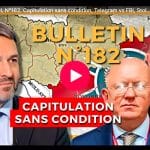
 Unconditional surrender, Telegram vs FBI, Stoltenberg empties stocks
Unconditional surrender, Telegram vs FBI, Stoltenberg empties stocks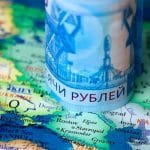
 Despite sanctions, Russia repays its debt
Despite sanctions, Russia repays its debt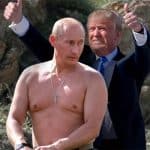
 Europe panics as Trump rises from his political grave
Europe panics as Trump rises from his political grave
 A young Russian gives her version of Edith Piaf's Ode to Love
A young Russian gives her version of Edith Piaf's Ode to Love
 Verbal escalation between Paris and Moscow, lucrative business
Verbal escalation between Paris and Moscow, lucrative business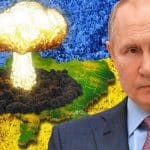
 Patrushev: the Atlantic Alliance wants to weaken and dismember Russia
Patrushev: the Atlantic Alliance wants to weaken and dismember Russia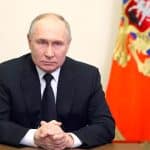
 Putin's speech following the terrorist attack at Crocus City Hall
Putin's speech following the terrorist attack at Crocus City Hall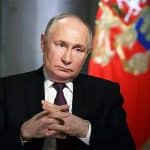

 The State will take from your A savings accounts to finance the war.
The State will take from your A savings accounts to finance the war.